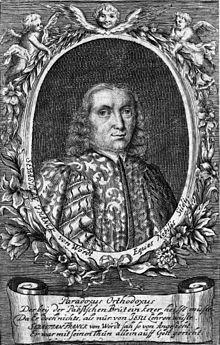Nuda scriptura
 From Wikipedia - Reading time: 4 min
From Wikipedia - Reading time: 4 min

Nuda scriptura, also called solo scriptura, meaning "bare scripture"[2][3] is a term used by some Protestants to describe the view that scripture is the only rule of faith to the exclusion of all other sources, while in contrast, sola scriptura teaches that the scripture alone is infallible, without excluding church tradition and other sources entirely, but viewing them as subordinate and ministerial.[4][5][6][7][8]
History
[edit]A view similar to nuda scriptura was advocated by Sebastian Franck, even arguing that the early Church theologians were servants of the Antichrist.[1] Nuda scriptura was taught by a few Anabaptists such as Conrad Grebel and some radical reformers, insisting that Christians should not look to tradition but to the Scripture alone.[9][10][11] However, many radical reformers did not argue for nuda scriptura, including Balthasar Hubmaier, who often quoted the Church fathers in his writings.[1]
Some Evangelicals and many Plymouth Bretheren also teach views comparable to nuda scriptura.[12][13] The view is especially common within modern fundamentalism.[14]
In the 12th century, Petrobrusians Peter of Bruys and Henry of Lausanne disputed the authority of the Church Fathers and the Roman Catholic Church.[15][16]
Restorationist minister Alexander Campbell (1788–1866) taught a view that has been compared to nuda scriptura.[17] However, his call to relying on the Bible as the only authoritative source was motivated by a call to unity and disregard denominationalism. [18]
See also
[edit]References
[edit]- ^ a b c Duesing, Jason G.; Finn, Nathan A. (2021-02-15). Historical Theology for the Church. B&H Publishing Group. ISBN 978-1-4336-4916-5.
- ^ Sola Scriptura: Biblical and Theological Perspectives on Scripture, Authority, and Hermeneutics. BRILL. 2017-11-06. ISBN 978-90-04-35643-6.
- ^ Spencer, Andrew J. (2019-12-05). The Christian Mind of C. S. Lewis: Essays in Honor of Michael Travers. Wipf and Stock Publishers. ISBN 978-1-5326-6164-8.
- ^ Carson, D. A. (2015-01-27). Themelios, Volume 36, Issue 2. Wipf and Stock Publishers. ISBN 978-1-7252-3466-6.
- ^ Dockery, David S.; Massey, James Earl; Smith, Robert Jr. (2018-04-20). Worship, Tradition, and Engagement: Essays in Honor of Timothy George. Wipf and Stock Publishers. ISBN 978-1-4982-9850-6.
- ^ Strange, Daniel (2015-05-08). 'For Their Rock is not as Our Rock': An Evangelical Theology Of Religions. Inter-Varsity Press. ISBN 978-1-78359-374-3.
- ^ Barrett, Matthew. "'Sola Scriptura' Radicalized and Abandoned". The Gospel Coalition. Retrieved 2022-06-25.
- ^ Treier, Daniel J. (2007), Treier, Daniel J.; Larsen, Timothy (eds.), "Scripture and hermeneutics", The Cambridge Companion to Evangelical Theology, Cambridge Companions to Religion, Cambridge: Cambridge University Press, pp. 35–50, ISBN 978-0-521-84698-1, retrieved 2022-06-25
- ^ Cone, Steven D. (2018-02-22). Theology from the Great Tradition. Bloomsbury Publishing. ISBN 978-0-567-67002-1.
- ^ Barrett, Matthew (2016-09-20). God's Word Alone---The Authority of Scripture: What the Reformers Taught...and Why It Still Matters. Zondervan Academic. ISBN 978-0-310-51573-9.
- ^ Holcomb, Justin S.; Johnson, David A. (2017-07-25). Christian Theologies of the Sacraments: A Comparative Introduction. NYU Press. ISBN 978-0-8147-7010-8.
- ^ Castaldo, Christopher A. (2009-10-06). Holy Ground: Walking with Jesus as a Former Catholic. Zondervan. ISBN 978-0-310-56250-4.
- ^ Sawyer, M. James (2016-04-11). The Survivor's Guide to Theology. Wipf and Stock Publishers. ISBN 978-1-7252-3672-1.
- ^ Cone, Steven D. (2018-02-22). Theology from the Great Tradition. Bloomsbury Publishing. ISBN 978-0-567-67001-4.
- ^ F. L. Cross; E. A. Livingstone, eds. (1997). The Oxford Dictionary of the Christian Church, 3rd edition. USA: Oxford University Press. p. 1264. ISBN 0-19-211655-X.
- ^ Langmuir, Gavin I. (February 1996). Toward a Definition of Antisemitism. University of California Press. ISBN 978-0-520-06143-9.
Henry rejected the authority of the church fathers
- ^ Barrett, Matthew. "'Sola Scriptura' Radicalized and Abandoned". The Gospel Coalition. Retrieved 2022-07-04.
- ^ Foster et al. 2004, pp. 252–54, 'Creeds and Confessions'.
 KSF
KSF